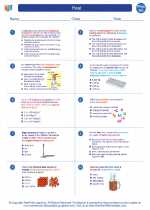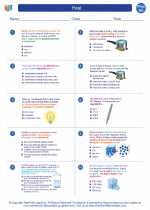Neuroscience
Neuroscience is the scientific study of the nervous system, which includes the brain, spinal cord, and networks of sensory and motor neurons. It encompasses a wide range of disciplines, including neurobiology, psychology, and computer science, and aims to understand the structure and function of the nervous system at various levels of analysis.
Key Concepts in Neuroscience
- Neurons: Neurons are the basic building blocks of the nervous system. They are specialized cells that transmit information through electrical and chemical signals.
- Neurotransmission: Neurotransmitters are chemical messengers that allow communication between neurons. The process of neurotransmission is crucial for various functions, including learning, memory, and motor control.
- Brain Structure and Function: The brain is divided into different regions, each responsible for specific functions such as sensory perception, motor control, and higher cognitive processes.
- Neuroplasticity: Neuroplasticity refers to the brain's ability to reorganize itself in response to new experiences, learning, or injury. It plays a fundamental role in development, learning, and recovery from brain damage.
- Behavior and Cognition: Neuroscience seeks to understand the neural mechanisms underlying behavior, emotions, and cognitive processes, such as attention, decision-making, and language.
Study Guide for Neuroscience
To effectively study neuroscience, it is important to grasp the fundamental concepts and develop a multidisciplinary understanding of the subject. Here are some tips for studying neuroscience:
- Understand the Basics: Start by learning the basics of neuroanatomy, neuronal communication, and neural circuits. Understanding the structure and function of neurons and the nervous system is crucial for building a solid foundation in neuroscience.
- Interdisciplinary Approach: Since neuroscience draws from various disciplines, including biology, psychology, and physics, consider incorporating knowledge from these fields to gain a holistic understanding of the subject.
- Experimentation and Research: Engage in hands-on laboratory work or research projects to gain practical experience in neuroscience. This may involve conducting experiments, analyzing data, and understanding research methodologies used in the field.
- Stay Updated: Neuroscience is a rapidly evolving field with new discoveries and advancements. Stay updated with current research, scientific journals, and emerging technologies in neuroscience to broaden your knowledge base.
- Critical Thinking: Develop critical thinking skills to analyze and interpret complex scientific data, theories, and research findings in neuroscience. This will help you form well-reasoned conclusions and contribute to scientific discourse.
By following these study tips and continuously exploring the multifaceted nature of neuroscience, you can develop a strong understanding of the subject and contribute to the advancements in this exciting field.
.◂Physics Worksheets and Study Guides High School. Heat
The resources above cover the following skills:
PHYSICAL SCIENCE (NGSS)
Energy
Students who demonstrate understanding can:
Create a computational model to calculate the change in the energy of one component in a system when the change in energy of the other component(s) and energy flows in and out of the system are known.
Develop and use models to illustrate that energy at the macroscopic scale can be accounted for as either motions of particles or energy stored in fields.



